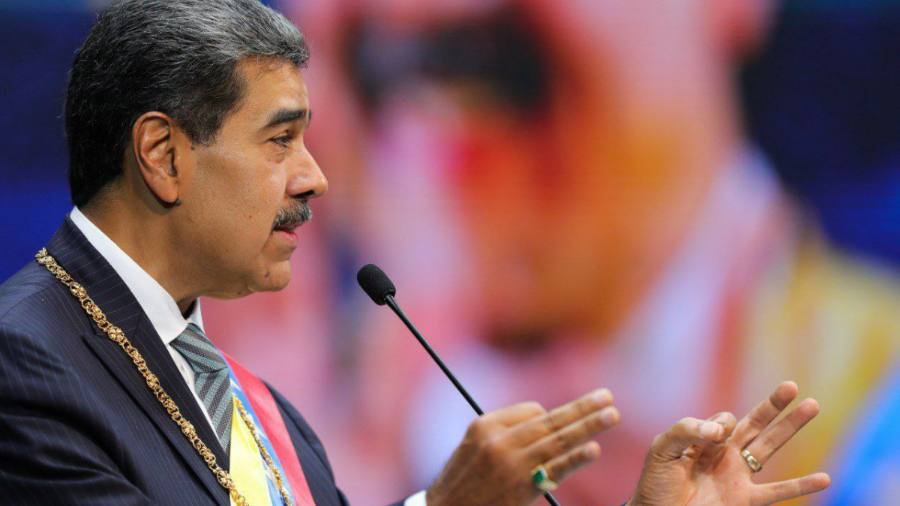By Andreína Chávez Alava for Venezuelanalysis
Venezuelan President Nicolás Maduro proposed a global “Summit for Peace and Against War” to establish a “lasting peace” in West Asia, with a focus on the dismantling of Israel’s undeclared nuclear arsenal and program.
The proposal comes in the aftermath of a 12-day conflict between Iran and Israel, in which Tel Aviv and the Trump administration bombed Iranian territory, including nuclear facilities, raising serious concerns about the potential for a nuclear catastrophe.
In a letter addressed to world leaders, Maduro urged a multilateral effort to secure a permanent ceasefire between Iran and Israel and demand regional denuclearization.
“We propose advancing the creation of a Nuclear-Weapon-Free Zone in West Asia, and call on the [UN] Security Council to implement a mechanism for nuclear disarmament in Israel, whose secret arsenal poses a serious threat to regional and global stability,” the statement read.
The missive condemned Israel’s “sustained impunity” in refusing to allow International Atomic Energy Agency (IAEA) inspections as well as its refusal to sign and comply with the Treaty on the Non-Proliferation of Nuclear Weapons (NPT).
The Venezuelan-led would-be initiative likewise aims to achieve the recognition of the Palestinian people’s right “to a sovereign state with East Jerusalem as its capital” and refugees’ right to return to their land.
In a separate statement issued on Tuesday, the Maduro government reiterated the need for a global peace summit to be hosted in a West Asian country and collectively led by the Arab League, the Organization of Islamic Cooperation, the Gulf Cooperation Council, and BRICS.
“We reaffirm that lasting peace in the region will be impossible without a just resolution to the Palestinian cause, in accordance with United Nations resolutions,” the communique concluded.
On Tuesday, Iranian President Masoud Pezeshkian announced the end of the 12-day conflict with Israel, attributing the hostilities to the “adventurism and provocation” of the Benjamin Netanyahu government. Similarly, Tel Aviv confirmed that it had agreed to a ceasefire.
The truce was declared on Monday by President Donald Trump following Qatar’s mediation. However, just hours later, Israel launched strikes on Tehran, accusing Iran of violating the ceasefire—an allegation denied by Iranian authorities.
On Monday, ahead of the cessation of hostilities, Iran launched a missile attack on the Al Udeid air base in Doha, Qatar, the largest US military asset in West Asia.
The Islamic Revolutionary Guard Corps (IRGC) stated that the strike was a response to the “blatant military aggression” by the Trump White House against three Iranian nuclear facilities on June 13. According to experts, Iran’s nuclear program was damaged but not eliminated. Tehran has pledged to continue advancing its nuclear technology for peaceful purposes.
Caracas, one of Iran’s closest allies, described the ceasefire as an “essential first step” toward de-escalation and a pathway to achieving a “structural and lasting solution.”
The Maduro administration has repeatedly defended Iran’s right to defend its sovereignty and attributed the 12-day crisis to the “unjustified aggressions” by Israel and the United States against Iranian territory, actions it claims violate international law.
The fragile truce appears to be holding as Iran and Israel warn they are prepared to renew hostilities if provoked. On Tuesday, the Iranian people took to the streets to celebrate “victory” in the conflict and in support of the ceasefire.
Reports indicate that Israeli and US strikes on Iranian residential and nuclear sites caused 610 deaths, including 49 women and 13 children, along with 4,746 injuries.
Meanwhile, the US-backed Israeli assault and total blockade on Gaza have continued, with at least 870 Palestinians killed in the past two weeks, bringing the total death toll to over 56 thousand. Since May 19, Israel has allowed limited aid deliveries, but human rights groups have denounced frequent killings at distribution sites as “human slaughterhouses.”
Venezuela was among the first to denounce Israel’s ongoing genocide in Gaza and its aggressions throughout the region, with Maduro condemning an “imperialist war” aimed at controlling Middle Eastern resources. Caracas also supported South Africa’s effort to bring genocide charges against Israel before the International Court of Justice.
On June 19, thousands of Venezuelans rallied in solidarity with Iran and Palestine, reaffirming Caracas and Tehran’s alliance and shared opposition to US hegemony worldwide, fostered under the former Hugo Chávez government.
Edited by José Luis Granados Ceja in Mexico City, Mexico.

